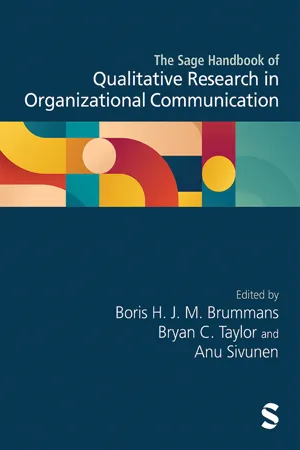
The Sage Handbook of Qualitative Research in Organizational Communication
- 744 pages
- English
- ePUB (mobile friendly)
- Available on iOS & Android
The Sage Handbook of Qualitative Research in Organizational Communication
About this book
The Sage Handbook of Qualitative Research in Organizational Communication is a state-of-the-art resource for scholars, students, and practitioners seeking to deepen their understanding and expertise in this dynamic field.
Written by a global team of established and emerging experts, this Handbook provides a comprehensive exploration of the field's foundational traditions of epistemology and theory, as well as its latest methodologies, methods, issues, and debates.
The volume reflects a diverse range of approaches (e.g., mixed-methods, ethnographic, rhetorical, pragmatist, phenomenological, feminist, critical race, postcolonial, queer, and engaged), and covers a broad spectrum of topics ranging from data collection and analysis, to representation.
Additionally, this Handbook addresses emerging trends such as digital forensics, post-qualitative research, and the transformative impact of COVID-19 on the conduct of qualitative research in organizational communication.
As the first volume of its kind in this field, The Sage Handbook of Qualitative Research in Organizational Communication is a cornerstone text for scholars, students, and practitioners interested in understanding the vital role of communication in organizational life.
Part 1: Approaches to Qualitative Organizational Communication Research
Part 2: Data Collection in Qualitative Organizational Communication Research: Methods and Issues
Part 3: Data Analysis and Representation in Qualitative Organizational Communication Research: Methods and Issues
Part 4: The Future of Qualitative Organizational Communication Research
Frequently asked questions
- Essential is ideal for learners and professionals who enjoy exploring a wide range of subjects. Access the Essential Library with 800,000+ trusted titles and best-sellers across business, personal growth, and the humanities. Includes unlimited reading time and Standard Read Aloud voice.
- Complete: Perfect for advanced learners and researchers needing full, unrestricted access. Unlock 1.4M+ books across hundreds of subjects, including academic and specialized titles. The Complete Plan also includes advanced features like Premium Read Aloud and Research Assistant.
Please note we cannot support devices running on iOS 13 and Android 7 or earlier. Learn more about using the app.
Information
Table of contents
- Cover
- Half Title
- Editorial Advisory Board
- Title Page
- Copyright Page
- Contents
- About the Editors
- About the Contributors
- Foreword
- Acknowledgments
- Introduction: Toward a Methodological Lingua Franca for Qualitative Research in Organizational Communication
- Part I Approaches to Qualitative Organizational Communication Research
- 1 From Mixed Methods to Mixed Research Approaches for Qualitative Organizational Communication Research
- 2 Ethnographic Approaches to Qualitative Organizational Communication Research
- 3 Rhetorical Approaches to Qualitative Organizational Communication Research
- 4 Pragmatist Approaches to Qualitative Organizational Communication Research
- 5 Phenomenological Approaches to Qualitative Organizational Communication Research
- 6 Approaches to Qualitative Research on the Communicative Constitution of Organizations
- 7 Feminist Approaches to Qualitative Organizational Communication Research
- 8 Critical Race Theory and Intersectional Approaches to Qualitative Organizational Communication Research
- 9 Postcolonial Qualitative Research in Organizational Communication
- 10 Queer Approaches to Qualitative Organizational Communication Research
- 11 Ethnography of Communication Approaches to Qualitative Organizational Communication Research
- 12 Autoethnography and Organizational Communication: Tracing their Convergence and Divergence
- 13 Engaged Scholarship Approaches to Qualitative Organizational Communication Research
- Part II Data Collection in Qualitative Organizational Communication Research: Methods and Issues
- 14 Research Design in Qualitative Organizational Communication Research
- 15 Challenges Faced by Qualitative Researchers in Negotiating Access to Organizational Communication Settings
- 16 Interviews and Focus Groups in Qualitative Organizational Communication Research
- 17 Participatory Methods in Qualitative Organizational Communication Research
- 18 Collecting Digital Data in Qualitative Organizational Communication Research
- 19 Collecting Visual Data in Qualitative Organizational Communication Research
- Part III Data Analysis and Representation in Qualitative Organizational Communication Research: Methods and Issues
- 20 Phronetic Iterative Qualitative Data Analysis in Organizational Communication Research
- 21 Narrative Analysis in Qualitative Organizational Communication Research
- 22 Rhetorical Analysis in Qualitative Organizational Communication Research
- 23 Conversation Analysis in Qualitative Organizational Communication Research
- 24 Ventriloquial Analysis in Qualitative Organizational Communication Research
- 25 Analysis of Sociomateriality and Affect in Qualitative Organizational Communication Research
- 26 Critical Discourse Analysis in Qualitative Organizational Communication Research
- 27 Past, Present, and Future Analysis of Digital Work in Qualitative Organizational Communication Research
- 28 Analysis of Tensions and Paradoxes in Qualitative Organizational Communication Research
- 29 A Process Ontology Perspective on Qualitative Analysis in Organizational Communication Research
- 30 Positionings: Toward a Relational Understanding of Representation and Writing in Organizational Communication Research
- Part IV The Future of Qualitative Organizational Communication Research
- 31 Digital Forensics: A Guide to Conducting Qualitative Research on Organizational Communication and Digital Technology
- 32 Hybridity, Visibility, and Organizing: Globalization and Qualitative Methods in Organizational Communication Research
- 33 Organizing Postqualitative Research in Organizational Communication
- 34 Qualitative Research in Organizational Communication Post-COVID-19
- Afterword from the Perspective of a Management Scholar
- Afterword from the Perspective of Two Organizational Communication Scholars
- Index